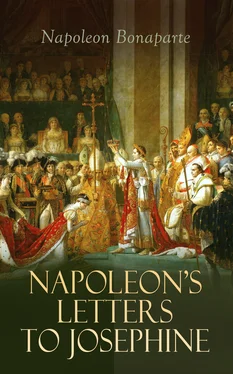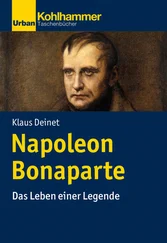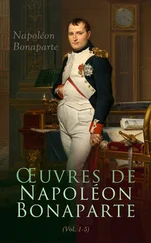Napoleon Bonaparte
Napoleon's Letters to Josephine
e-artnow, 2021
Contact: info@e-artnow.org
EAN 4064066498726
PREFACE
INTRODUCTION
SERIES A
SERIES B
SERIES C
SERIES D
SERIES E
SERIES F
SERIES G
SERIES H
SERIES I
SERIES J
SERIES K
SERIES L
SERIES M
SERIES N
SERIES O
SERIES P
Table of Contents
I have no apology to offer for the subject of this book, in view of Lord Rosebery's testimony that, until recently, we knew nothing about Napoleon, and even now "prefer to drink at any other source than the original."
"Study of Napoleon's utterances, apart from any attempt to discover the secret of his prodigious exploits, cannot be considered as lost time." It is then absolutely necessary that we should, in the words of an eminent but unsympathetic divine, know something of the "domestic side of the monster," first hand from his own correspondence, confirmed or corrected by contemporaries. There is no master mind that we can less afford to be ignorant of. To know more of the doings of Pericles and Aspasia, of the two Cæsars and the Serpent of old Nile, of Mary Stuart and Rizzio, of the Green Faction and the Blue, of Orsini and Colonna, than of the Bonapartes and Beauharnais, is worthy of a student of folklore rather than of history.
Napoleon was not only a King of Kings, he was a King of Words and of Facts, which "are the sons of heaven, while words are the daughters of earth," and whose progeny, the Genii of the Code, still dominates Christendom.1 In the hurly-burly of the French War, on the chilling morrow of its balance-sheet, in the Janus alliance of the Second Empire, we could not get rid of the nightmare of the Great Shadow. Most modern works on the Napoleonic period (Lord Rosebery's "Last Phase" being a brilliant exception) seem to be (1) too long, (2) too little confined to contemporary sources. The first fault, especially if merely discursive enthusiasm, is excusable, the latter pernicious, for, as Dr. Johnson says of Robertson, "You are sure he does not know the people whom he paints, so you cannot suppose a likeness. Characters should never be given by a historian unless he knew the people whom he describes, or copies from those who knew him ."
Now, if ever, we must fix and crystallise the life-work of Napoleon for posterity, for "when an opinion has once become popular, very few are willing to oppose it. Idleness is more willing to credit than inquire ... and he that writes merely for sale is tempted to court purchasers by flattering the prejudices of the public."2 We have accumulated practically all the evidence, and are not yet so remote from the aspirations and springs of action of a century ago as to be out of touch with them. The Vaccination and Education questions are still before us; so is the cure of croup and the composition of electricity. We have special reasons for sympathy with the first failures of Fulton, and can appreciate Napoleon's primitive but effective expedients for modern telegraphy and transport, which were as far in advance of his era as his nephew's ignorance of railway warfare in 1870 was behind it. We must admire The Man3 who found within the fields of France the command of the Tropics, and who needed nothing but time to prosper Corsican cotton and Solingen steel. The man's words and deeds are still vigorous and alive; in another generation many of them will be dead as Marley—"dead as a door-nail." Let us then each to his task, and each try, as best he may, to weigh in honest scales the modern Hannibal—"our last great man,"4 "the mightiest genius of two thousand years."5
H. F. HALL.
Table of Contents
Difficulties of translation—Napoleon as lexicographer and bookworm—Historic value of his Bulletins—A few aspects of Napoleon's character—"Approfondissez!"—The need of a Creator—The influence of sea power—England's future rival—-Napoleon as average adjuster—His use of Freemasonry—Of the Catholics and of the Jews—His neglect of women in politics—Josephine a failure—His incessant work, "which knew no rest save change of occupation"—His attachment to early friendships—The Bonaparte family—His influence on literary men—Conversations with Wieland and Müller—Verdict of a British tar—The character of Josephine—Sources of the Letters—The Tennant Collection—The Didot Collection—Archibald Constable and Sir Walter Scott—Correspondence of Napoleon I.—Report of the Commission—Contemporary sources—The Diary—Napoleon's heritage.
Napoleon is by no means an easy writer to translate adequately. He had always a terse, concise mode of speaking, and this, with the constant habit of dictating, became accentuated. Whenever he could use a short, compact word he did so. The greatest temptation has been to render his very modern ideas by modern colloquialisms. Occasionally, where Murray's Dictionary proves that the word was in vogue a century ago, we have used a somewhat rarer word than Napoleon's equivalent, as e.g. "coolth," in Letter No. 6, Series B ( pendant le frais ), in order to preserve as far as possible the brevity and crispness of the original. Napoleon's vocabulary was not specially wide, but always exact. In expletive it was extensive and peculiar. Judging his brother by himself, he did not consider Lucien sufficient of a purist in French literature to write epics; and the same remark would have been partly true of the Emperor, who, however, was always at considerable pains to verify any word of which he did not know the exact meaning.6 His own appetite for literature was enormous, especially during the year's garrison life he spent at Valence, where he read and re-read the contents of a bouquiniste's shop, and, what is more, remembered them, so much so that, nearly a quarter of a century later, he was able to correct the dates of ecclesiastical experts at Erfurt. Whatever he says or whatever he writes, one always finds a specific gravity of stark, staring facts altogether abnormal. For generations it was the fashion to consider "as false as a bulletin" peculiar to Napoleon's despatches; but the publication of Napoleon's correspondence, by order of Napoleon III., has changed all that. In the first place, as to dates. Not only have Haydn, Woodward and Cates, and the Encyclopædia Britannica made mistakes during this period, but even the Biographie Universelle (usually so careful) is not immaculate. Secondly, with regard to the descriptions of the battles. We have never found one that in accuracy and truthfulness would not compare to conspicuous advantage with some of those with which we were only too familiar in December 1899. Napoleon was sometimes 1200 miles away from home; he had to gauge the effect of his bulletins from one end to the other of the largest effective empire that the world has ever seen, and, like Dr. Johnson in Fleet Street reporting Parliamentary debates (but with a hundred times more reason), he was determined not to let the other dogs have the best of it. The notes on the battles of Eylau (Series H) and Essling (Series L), the two most conspicuous examples of where it was necessary to colour the bulletins, will show what is meant. Carlyle was the first to point out that his despatches are as instinct with genius as his conquests—his very words have "Austerlitz battles" in them. The reference to "General Danube," in 1809, as the best general the Austrians had, was one of those flashes of inspiration which military writers, from Napoleon to Lord Wolseley, have shown to be a determining factor in every doubtful fray.
" Approfondissez
Читать дальше












